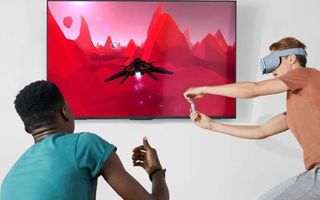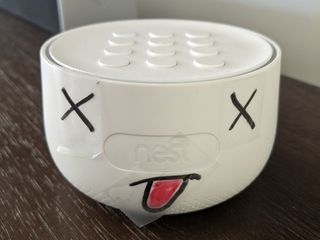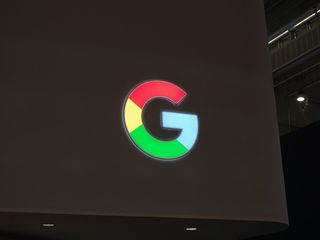Stadia Games' death cuts to the heart of Google's commitment issues

Google has a well-deserved reputation for killing any product or brand that hasn't become the leader in its field, mashing the leftover bits into a Frankenstein's monster with other projects, and rebranding the results with a snazzy new name. Google News + Weather and Google Reader combined into Google News, Inbox's best features were smushed into Gmail, Google Play Music became YouTube Music, and so on. Case in point, Google killed or renamed nine services in 2020.
Android Central's own Jerry Hildenbrand convincingly explained why Google kills so many of its projects. It's usually to give new life to underperforming software or apps while adding some innovative new features along the way. To paraphrase Luke Skywalker, none of them are ever really gone. They're just reborn, hopefully to a wider audience.
I can't argue with Google's approach to software. In terms of some of its recent product and entertainment ventures, I'm much more concerned. The premature collapse of Stadia Games and Entertainment is just one piece of evidence that Google's impatience with underperforming tech is hurting its efforts to expand its business. And the more projects Google cancels, the less consumers will trust Google when it launches new product ventures. It's a negative feedback loop that I sincerely hope the company will cut off.
Stadia is(n't) dead, long live Stadia?

On February 2, Google announced that Stadia Games and Entertainment was shutting down. Stadia Games was a first-party development studio meant to make Stadia exclusives, first announced in March 2019 but officially launched in Montreal in October 2019. Google hired industry veteran Jade Raymond to head the team, acquired Typhoon Studios to grow the team, and launched a second LA-based studio in March 2020.
Stadia Games released one Stadia exclusive: Journey to the Savage Planet, a rerelease of Typhoon Studios' old game with some new content. It came out with little fanfare, overshadowed by the news of the studio's collapse.
Google should have known that launching a game studio is a long-term investment that takes years to pay off.
Believe it or not, but video games generally take more than a year to develop. Shocking, I know! I don't know what Raymond was working on before she left the company, but that's not surprising. Developing a new IP takes years with larger, more established studios. Any promotional materials or E3 trailers would have been premature and probably wildly optimistic. It's possible the closing was triggered by SG&E telling Google executives they were developing a multi-million dollar visual novel where you can romance a cockroach, bed bug, spider, tick, hornet, or scorpion. More likely, all of this is stemming from Stadia's underperforming sales or subscription numbers.
Stadia had a rocky start, offering a limited library of expensive, older games and not enough features to make it stand out. Since then, the service has sincerely improved into a respectable platform with high-performing ports of games like Cyberpunk 2077 and Hitman 3. But it was always going to take time, and more flashy exclusives, to shake off the bad initial impression Stadia gave to gamers. And Google wasn't willing to give it that time.
Be an expert in 5 minutes
Get the latest news from Android Central, your trusted companion in the world of Android
As my colleague pointed out in his Stadia analysis, Google is sending a terrible message by firing or redistributing its developers. Why should other video game publishers create ports for a platform that its own company won't invest in, less than two years since launch?
By contrast, Amazon Game Studios — founded in 2012 — has had years to develop games, most of which have been epic failures. But Amazon's new CEO publicly committed to continue investing in games development, which signals to potential Amazon Luna customers that they might get some exclusives in the future and that Amazon hopefully won't abandon them.
Amazon probably won't make the next Fortnite, but so long as its executives keep supporting its devs in their efforts, customers won't look at Luna as a sunk cost. Whereas no matter how long Stadia sticks around, most gamers will think of it as a lost cause.
Daydreaming of Google's gaming potential

Remember when Google Cardboard helped millions of people experience VR without having to pay for the privilege? It significantly grew the public's awareness of tech that had hitherto been incredibly niche since Oculus made people buy an expensive headset and even more expensive PC to try it.
Google did some admirable work with free VR experiences, particularly Expeditions that would take students on virtual field trips. But when its Daydream View headset didn't capture as much attention as Samsung Gear VR, Google turned its attention to augmented reality, pawned off its VR OS to Lenovo, and eventually killed Daydream and made its Cardboard tech open source. By the time Google made Tilt Brush open source last week, it was clear that the company doesn't intend to buy back into the technology.
Meanwhile, of course, the Oculus Quest 2 is selling amazingly well, with over 60 Quest games generating $1 million or more in profits. Unhappy with giving up any market to a rival, Apple is reportedly developing an Apple VR headset with 8K lenses. And Valve plans to follow up its expensive, niche Index headset with a wireless Valve Index.
If Google had stuck with VR, it could have been a major boon for Stadia.
Imagine if Google had stayed invested in VR and offered to stream games virtually to its headset as part of the Stadia Pro package. The Quest 2, which is essentially a beefed-up Android headset, already offers wireless streaming of games, albeit through sideloading, so this isn't an outlandish idea. Along with streaming console games to phones, Stadia could have advertised itself as a service that ported popular games as full VR experiences while offering VR exclusives of its own. It would have helped Stadia differentiate itself from a crowded gaming industry.
Instead, the only headset that Google has made in the last few years is Google Glass 2, a limited, expensive AR device for business solutions.
Securing customers' trust or destroying it

Google's apparent aversion to supporting any products that aren't Android phones or Google Assistant speakers extends to the world of security cameras. Google purchased Nest in 2014 and used it to build its smart home ecosystem, Works with Nest. Eventually, Google changed over its Nest and Nest-compatible devices to its new Google Home brand. That's entirely on-brand for Google, and we're big fans of the Google Home app in general!
The main issue arose when Google decided to discontinue Nest Secure, a cheap DIY home security system that was reliably secure and popular with consumers. It easily made our list of the best home security systems before Google murdered it, leaving its customers bewildered and uncertain how long their home security would keep working.
It's easy to piece together a timeline of what happened. Google invested $450 million in ADT security in August 2020, promising to provide ADT with Nest security cameras to secure the partnerships. Three months later, Google dumped the Nest Security brand so it could give all its attention to its new brand, uninterested in the customer base it had built up for half a decade.
And what's the other best budget home security system for DIY users to turn to instead? Ring Alarm, owned by Amazon.
Again, Google hasn't given up on Nest and still plans to release new 2021 Nest Cams. But abandoning such a major aspect of Nest only confuses the matter, making it less likely that people will choose it over another brand. Sound familiar, Stadia users?
Will Google sell Stadia to another company and push its customers to Amazon? It won't be the first time.
More and more, Google is selling products to consumers as a test run, then taking them off the market in search of business-to-business (b2b) sales instead. Nest security cameras, Google Glass, and the Nest Thermostat E are just a few examples of this. What does this have to do with Stadia? The Verge claims that Google intends to keep Stadia online just long enough to sell it directly to a video game publisher like EA or Activision as a personal cloud gaming service. In other words, Stadia would be — wait for it — a consumer test-run for an eventual b2b sale.
At that point, it's not clear what will happen to all of the Stadia ports people bought. Will Google promise to keep some servers reserved so people can keep playing their "owned" games, or will it just tell its customers they get X months and then shut everything down?
"Fool me twice . . . strike three."

As a Stadia Pro subscriber who also owns a PS5, Xbox One X, PC, and Switch, I know I'll be perfectly fine finding games if Google plays into stereotypes and grinds Stadia up into a profitable, boring paste for another corporate entity. But I can't deny that I'll be extremely disappointed.
Stadia needs some flashy third-party exclusives right now to convince people that it's not just another zombie Google product with no support or future.
For all its faults, Stadia has a growing library of games that perform about as well as they do on my next-gen console — and if Google had stuck to its guns, it could have been a haven for people who couldn't find one for sale but wanted to enjoy next-gen games. Many gamers avoid Stadia because of how much data it uses, so Google could have supported it by making Stadia Pro free for unlimited Google Fi subscribers. That never happened.
As soon as possible, Stadia's remaining developers need to announce some flashy third-party exclusives, to assure people they shouldn't give up on the platform, even if their parent company may be planning to sell them for parts. Then it needs to assure skeptical gamers that their purchases will be honored even if Google sells the company, then outline their plans to pay indie studios for more exclusives in the years ahead. Based on Google's patterns of behavior, though, I'm afraid that's wishful thinking.
People trust Android phones and like devices that pair with Google Assistant. But if Google abandons Stadia, the next time it releases some promising new hardware, my excitement is going to be tempered by cynicism. How many years before Google's latest pinnacle of innovation gets kicked to the curb?

Michael is Android Central's resident expert on fitness tech and wearables, with an enthusiast's love of VR tech on the side. After years freelancing for Techradar, Wareable, Windows Central, Digital Trends, and other sites on a variety of tech topics, AC has given him the chance to really dive into the topics he's passionate about. He's also a semi-reformed Apple-to-Android user who loves D&D, Star Wars, and Lord of the Rings.
For wearables, Michael has tested dozens of smartwatches from Garmin, Fitbit, Samsung, Apple, COROS, Polar, Amazfit, and other brands, and will always focus on recommending the best product over the best brand. He's also completed marathons like NYC, SF, Marine Corps, Big Sur, and California International — though he's still trying to break that 4-hour barrier.
